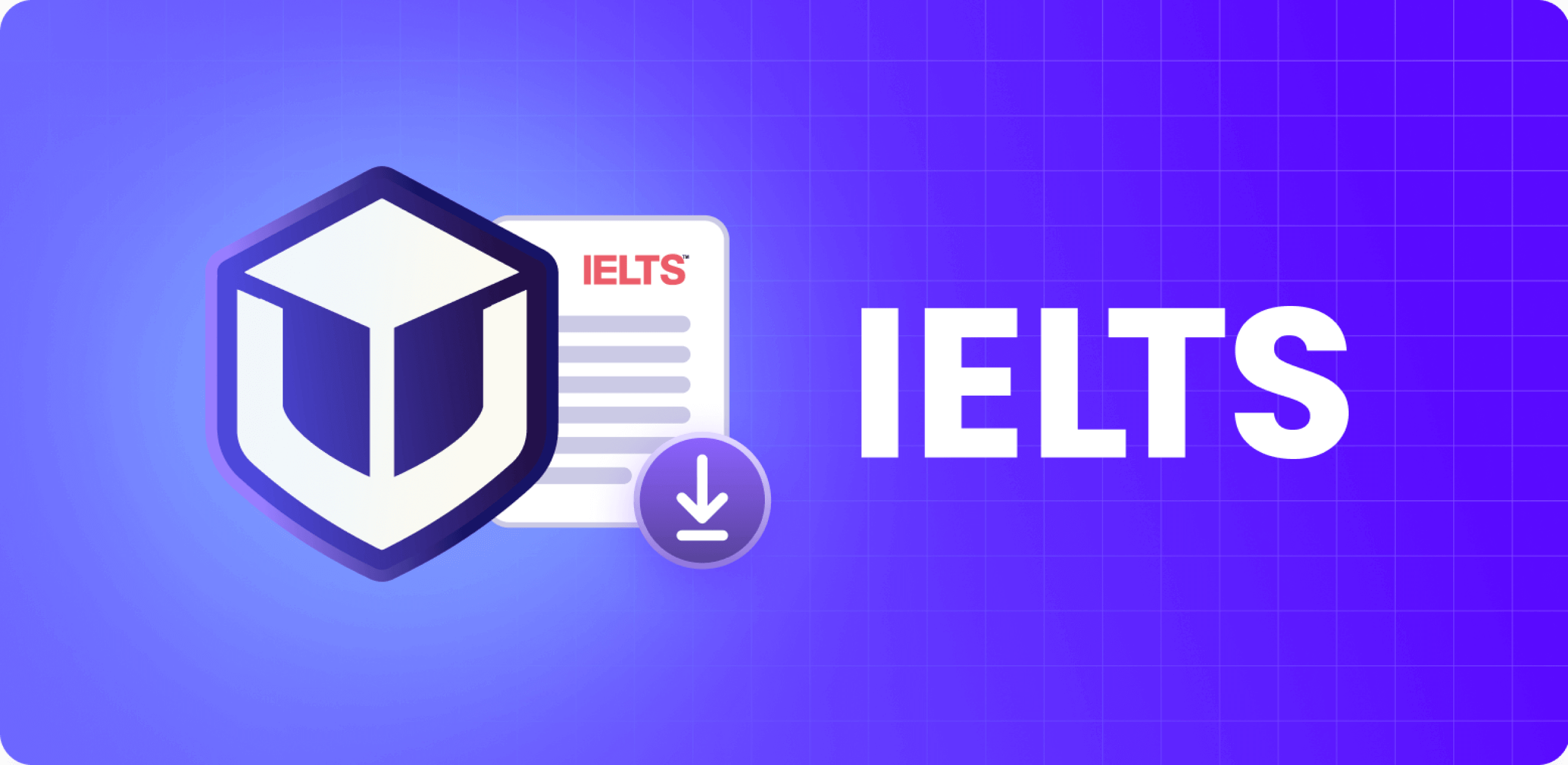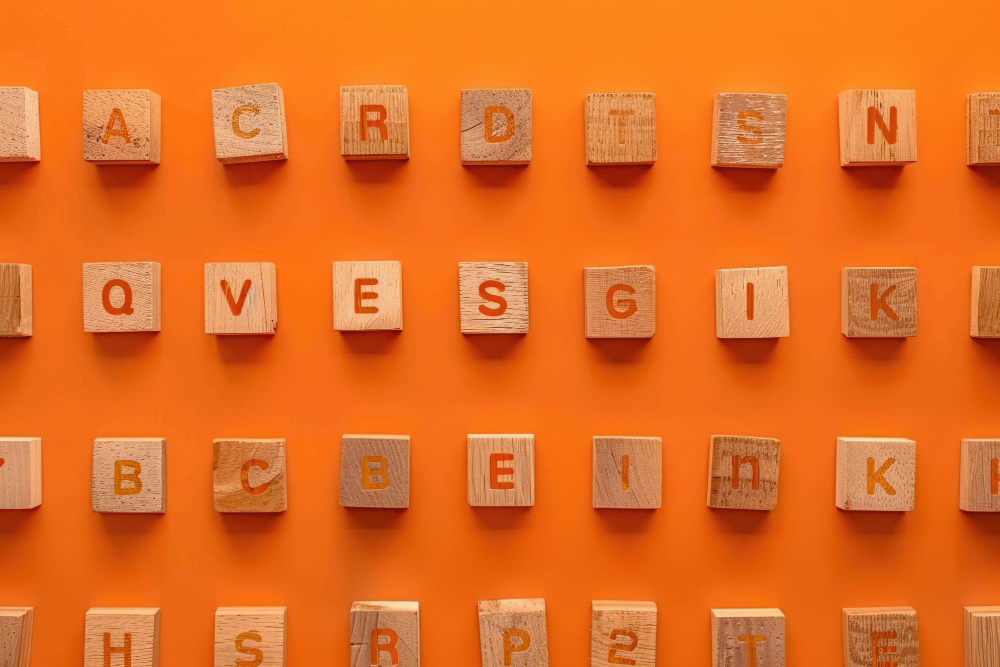Everyone dreams of scoring well in IELTS, but only a few people actually do it. Have you ever wondered why?
What sets those top scorers apart?
Honestly, it’s not about registering months in advance. From our experience coaching thousands of students for IELTS, we’ve seen people sign up just 30 days before the test and still score a 7+ band!
So, what’s their secret? Is it luck? Not really!
Here’s the deal: small, consistent efforts add up. You know how they say drops of water make a mighty ocean? Well, vocabulary is one of those small drops for IELTS! Just by learning 10-15 new words a day, you’re stacking up the knowledge that brings you closer to that 7+ band.
Learning all the words in this list will contribute to 25% of your overall IELTS band score. Have fun!🤝
Topic-wise Vocabulary Words for IELTS
There are plenty of ways to learn IELTS vocabulary, but before we dive into that, let us quickly explain why it’s so important!
Vocabulary plays a key role in all four IELTS modules. In Listening and Reading, you’ll encounter words that challenge your understanding. Meanwhile, the Speaking and Writing sections demand that you use various words to express your thoughts clearly.
To do well, you’ll need to know contextually relevant vocabulary across a wide range of topics to convey your ideas effectively and confidently.
Below, we’ve covered common categories or topics in IELTS, along with the most used words and their meanings!
IELTS Vocabulary Words for 6+ Bands (Difficulty Level: Medium)
Another effective way to enhance your vocabulary is to target a specific band score and prepare systematically, module by module, according to the tasks involved.
In this section, we’ll categorise the modules into two common groups based on their vocabulary requirements:
- Speaking and Writing
- Reading and Listening
IELTS Vocabulary: Lexical Words for Speaking and Writing Modules
Speaking and Writing modules require similar vocabulary, as they involve describing people or objects, sharing personal experiences, interpreting data, and giving opinions.
We’ve divided them into sections with common themes, get started:
Positive and Negative Qualities of People 😊😠
In the IELTS Speaking and Writing tasks, using vocabulary related to positive and negative qualities allows you to effectively discuss traits of individuals, whether in personal anecdotes or character evaluations.
For example, if you’re asked to describe your role model in the Cue Cards section of the Speaking test, you can highlight their positive qualities like “dedicated” or “compassionate,” which adds depth to your response.
In Writing Task 2, you might compare the qualities of leaders in an argument, enhancing your clarity and persuasiveness.
| Word | Meaning | Example Sentence |
|---|---|---|
| Blameless | Describes someone who is innocent or has done nothing wrong; morally pure. | She was blameless in the entire situation, acting with the best intentions. |
| Crazy | Refers to behaviour that is irrational or mentally unbalanced, often used informally. | His idea sounded crazy at first, but it turned out to be brilliant. |
| Arrogant | Describes someone with an inflated sense of their importance or abilities, often dismissing others. | His arrogant attitude alienated his friends, making it hard for them to relate. |
| Mischievous | Refers to someone who enjoys causing minor trouble or playful annoyances, often in a light-hearted way. | The child had a mischievous grin as he plotted his next prank. |
| Immodest | Describes someone lacking humility and tends to boast about their achievements or abilities. | He gave an immodest account of his success, bragging about every detail. |
| Generous | Describes a person willing to give or share freely, often showing kindness and selflessness. | She is generous with her time and resources, always helping those in need. |
| Jealous | Describes the feeling of envy towards someone else’s achievements, possessions, or relationships. | He became jealous when she got the promotion he had worked so hard for. |
| Disadvantaged | Refers to people with fewer opportunities or resources than others, often due to social or economic factors. | The charity supports disadvantaged children by providing them with educational resources. |
| Fortunate | Describes someone who has been blessed with good luck or favourable circumstances. | He felt fortunate to have a loving family and a stable job. |
Explore all countries

Get a Free IELTS Vocabulary Cheatsheet
With 350+ words you should know for a 7+ IELTS band score.
Communication and Interaction 🗣️🤝
In the Speaking test, you may need to describe a memorable conversation or a time you resolved a conflict. Using words like “active listening” or “non-verbal cues” can help illustrate your points more effectively for such topics.
In Writing Task 2, discussing the impact of technology on human interaction becomes easier with precise language, allowing you to construct strong, clear arguments.
| Word | Meaning | Example Sentence |
|---|---|---|
| To disclaim | To deny any responsibility or association with something is often used in formal contexts. | She disclaimed any involvement in the incident, stating she did not know of it. |
| To vary | To differ in size, amount, degree, or nature from something else, indicating diversity or change. | Opinions on the matter vary greatly among experts, highlighting differing perspectives. |
| Perception | How something is regarded, understood, or interpreted influences thoughts and actions. | His perception of the issue was spot on, leading to a successful resolution. |
| To establish | To make it permanent, set up or find something, such as an organisation or system. | They established the company in 1995, focusing on innovative technology solutions. |
| To disclose | To reveal or make known information that was previously kept secret or private. | In a press release, the company disclosed its annual earnings, surprising many investors. |
| To notify | To formally inform someone about something is often used in business or official communication. | Please notify me when the meeting starts, as I don’t want to miss any important updates. |
| To behave | To conduct oneself in a particular way, especially regarding manners or ethics. | The children behaved well during the trip, making the teachers proud. |
| To annoy | To irritate or cause discomfort to someone, often through repetitive actions or remarks. | His constant complaints annoyed everyone in the group, leading to frustration. |
Conditions and States🌡️😴
Vocabulary focused on conditions and states enhances your ability to describe personal experiences and observations in the IELTS exam.
For instance, when discussing health or emotional states in cue cards, terms like “stressful” or “overwhelmed” can help convey your feelings.
In Writing, you can discuss social conditions or economic states, using relevant vocabulary to provide strong examples that support your arguments.
| Word | Meaning | Example Sentence |
|---|---|---|
| Accurate | Describes something correct, precise, and free from errors, often relating to information or data. | His answers were accurate and well-researched, impressing the examiners. |
| Immediate | Describes something that occurs instantly or without delay, often indicating urgency. | She required immediate medical attention after the accident. |
| Vague | Refers to something that is not clearly expressed, defined, or detailed, leading to confusion. | His instructions could have been more specific and clear, leaving the team unsure of their next steps. |
| Understandable | Describes something easily comprehended or grasped, often relating to explanations or concepts. | The lesson was straightforward and understandable, helping all the students to follow along. |
| Indisputable | Describes evidence or facts that are beyond doubt or question; undeniable. | The evidence presented was indisputable in court, leading to a swift verdict. |
| Dreadful | Describes something terrible or extremely bad, often causing fear or distress. | The weather was dreadful during the holiday, ruining their plans for outdoor activities. |
| Dormant | Describes something inactive or in a state of rest, often referring to potential that has not yet been realised. | The volcano had been dormant for years, but scientists monitored it closely for signs of activity. |
| Defective | Describes an item that is faulty or not working correctly, often requiring repair or replacement. | The product was defective and had to be returned for a full refund. |
Objects and Items🛍️📦
In IELTS, discussing objects and items can come up in both Speaking and Writing tasks.
For example, in Part 2, when describing a favourite possession, using words like “functional” or “aesthetic” can give your response more detail.
In Writing Task 1, you might need to analyse a diagram or process involving various items, where clear vocabulary helps you explain how things work effectively.
| Word | Meaning | Example Sentence |
|---|---|---|
| Sacristy | Clergy often use a room in a church where sacred items, such as vestments and vessels, are kept. | After the service, the priest entered the sacristy to prepare for the next Mass. |
| Garbage can | A container designed for holding trash or waste materials, often found in homes and public places. | He threw the paper into the garbage can, making sure to recycle it properly. |
| Denim | Jeans made from durable cotton fabric are often associated with casual clothing styles. | He always wore his favourite pair of denim, which were comfortable and stylish. |
| Mannequin | A human figure model is used for displaying clothes in stores, helping customers visualise outfits. | The store dressed its mannequins in new outfits to attract shoppers. |
| Gratuity | A tip is given to service workers, such as waitstaff, as a gesture of appreciation for good service. | The waiter was pleased with the generous gratuity left by the satisfied customers. |
| Cube | A solid three-dimensional shape with six equal square faces is often used in mathematics or cooking. | She diced the vegetables into small cubes for the salad. |
Feelings and Emotions ❤️😢
In Speaking, you may be asked to describe your favourite movie. Using “nostalgic” or “heartwarming” can enhance your expression.
Discussing societal issues in writing often involves emotional appeals, and knowing how to articulate these feelings can make your arguments more compelling and relatable to the reader.
| Word | Meaning | Example Sentence |
|---|---|---|
| Terror | An intense feeling of fear or fright that can cause panic or distress. | The sudden storm filled the villagers with terror as they sought shelter. |
| Ecstasy | A state of overwhelming joy or happiness, often characterised by feelings of euphoria. | She was ecstatic when she won the award, unable to contain her excitement. |
| Joy | A feeling of great happiness and delight, often arising from personal achievements or meaningful experiences. | The news brought them pure joy, celebrating together with laughter and cheer. |
| Misery | A state of extreme unhappiness or suffering, often associated with difficult circumstances. | He lived in misery after the accident, struggling to cope with the changes in his life. |
| Remorse | A deep regret or guilt for a wrong committed often leads to a desire for atonement. | He felt deep remorse for his harsh words, wishing he could return them. |
Places and Time 🏙️⏳
When it comes to places and time, vocabulary helps you set the scene and provide context in your responses.
In the Speaking test, you may be asked to describe a memorable event/place where terms like “picturesque” or “historic” create vivid images.
In Writing, you might analyse changes over time in an essay, and using precise language related to time frames enhances clarity and helps structure your arguments more effectively.
| Word | Meaning | Example Sentence |
|---|---|---|
| Well-timed | Describes an event or action that occurs at the most suitable or advantageous moment. | Her well-timed joke lightened the mood during the serious meeting. |
| Expedition | A journey or voyage undertaken for a specific purpose, often involving exploration or research. | The scientists set out on an expedition to study the Arctic climate. |
| Headquarters | An organisation or business’s main office or centre of operations is typically where key decisions are made. | The company’s headquarters is in New York, where all major decisions are made. |
| Destination | A place that someone is travelling to often a goal for a journey or trip. | Their destination was a beautiful beach resort, perfect for relaxation. |
| Event | An occurrence or happening, especially one of significance or importance, is often planned or organised. | The annual festival was a highly anticipated event in the community. |
Concepts and Ideas 💡🧠
Being able to discuss abstract concepts shows how well you can think- critically. In Speaking, you might need to express your opinion on a social issue; using vocabulary like “perspective” or “philosophy” helps you articulate your thoughts clearly.
In Writing Task 2, analysing or evaluating concepts is often required, and a well-rounded vocabulary allows you to present nuanced arguments and counterarguments effectively.
| Word | Meaning | Example Sentence |
|---|---|---|
| Paradigm | A model or example that serves as a pattern for understanding or explaining a particular concept. | The new teaching paradigm focuses on student-centred learning. |
| Strategy | A plan of action is designed to achieve a specific goal or objective, often involving careful planning. | The marketing strategy was developed to increase brand awareness. |
| Philosophy | A set of beliefs or principles that guide behaviour and thought, often related to fundamental questions of existence. | His philosophy of life emphasises kindness and generosity towards others. |
| Conundrum | A confusing and difficult problem or question, often with no clear solution. | The team faced a conundrum when balancing quality with production speed. |
| Hypothesis | A proposed explanation or theory that can be tested through research and experimentation. | The scientist formulated a hypothesis to explain the unexpected results of the experiment. |
Nature and Environment 🌳🌍
Familiarity with vocabulary related to nature and the environment is particularly important for IELTS, as these topics often come up in both Speaking and Writing tasks.
For example, a common IELTS Speaking cue card might ask you to Describe a law on environmental protection. Using terms like “legislation,” “sustainability,” or “carbon emissions” will help you explain the law clearly and show your knowledge of environmental issues.
In Writing, discussing the importance of such laws requires precise vocabulary to express your views persuasively and effectively.
| Word | Meaning | Example Sentence |
|---|---|---|
| Ecosystem | A community of living organisms interacting with each other and their physical environment, forming a complex network. | The coral reef is a fragile ecosystem that supports a diverse range of marine life. |
| Biodiversity | The variety of life in a particular habitat or ecosystem is crucial for ecological balance. | Protecting biodiversity is essential for the health of our planet. |
| Pollution | Introducing harmful substances or contaminants into the environment negatively affects air, water, and land quality. | Pollution in the river has led to serious health concerns for the local community. |
| Conservation | The act of preserving and protecting natural resources and the environment from depletion or destruction. | Conservation efforts are underway to protect endangered species from extinction. |
| Climate | The long-term average weather patterns in a particular area influences the environment and living conditions. | Climate change is leading to unpredictable weather patterns and rising sea levels. |
Technology and Science💻🔬
Most IELTS topics revolve around technology and science, so it’s important to stay updated on current advancements. For example, a popular IELTS cue card topic is ‘Describe a time when your computer broke down’. Using vocabulary like “malfunction,” “technical glitch,” or “troubleshooting” can make your response more detailed and engaging.
In Writing, analysing the implications of scientific discoveries requires strong vocabulary to express complex ideas clearly and effectively, enhancing the quality of your essay.
| Word | Meaning | Example Sentence |
|---|---|---|
| Innovation | Introducing new ideas, methods, or products that improve efficiency or effectiveness. | The company is known for its commitment to innovation, constantly developing cutting-edge technologies. |
| Artificial Intelligence | The simulation of human intelligence processes by machines, particularly computer systems. | Artificial intelligence is transforming industries by automating tasks and providing insights. |
| Data | Facts and statistics collected for reference or analysis are often used in research and decision-making. | The researchers analysed the data to identify trends and make informed predictions. |
| Algorithm | A set of rules or instructions for solving a problem or performing a task, especially in computing. | The algorithm used in the app optimises search results based on user preferences. |
| Technology | The application of scientific knowledge for practical purposes often leads to new devices or methods. | Advances in technology have revolutionised communication and information sharing. |
More on:

IELTS Vocabulary: Lexical Words for Reading and Listening Modules
IELTS Listening and Reading usually have simple words and phrases. Having a good vocabulary range here will help you decipher main ideas, order of information, and
Main Ideas and Supporting Details 📚
Understanding main ideas and supporting details is crucial for both Listening and Reading modules, as it helps you grasp the overall message of a passage or audio clip.
In Listening, you may need to identify the main point of a lecture or conversation, while in Reading, distinguishing between main ideas and supporting details enables you to answer comprehension questions accurately.
| Word | Meaning | Example Sentence |
|---|---|---|
| Key Idea | The main thought or concept that is central to a discussion | The key idea of the article focuses on renewable energy. |
| Illustrate | To explain or make something clear by providing examples | The author illustrates their point with several case studies. |
| Emphasise | To give special importance to something | The study emphasizes the need for more research in this area. |
| Highlight | To bring attention to something important | The report highlights the challenges faced by small businesses. |
| Clarify | To make something clear or easier to understand | The speaker clarifies the main argument during the presentation. |
Opinion, Attitude, and Purpose 💬
Recognising opinions, attitudes, and purposes in texts and spoken materials enhances your ability to interpret the speaker’s or writer’s intentions.
In Listening, identifying a speaker’s attitude can aid in understanding the context of a discussion. Similarly, in Reading, discerning the author’s opinion helps you evaluate arguments and respond to questions related to their viewpoint.
| Word | Meaning | Example Sentence |
|---|---|---|
| Viewpoint | A particular attitude or way of considering a matter | From my viewpoint, the new policy is beneficial for the community. |
| Preference | A greater liking for one alternative over another | The survey showed a preference for online learning among students. |
| Assert | To state a fact or belief confidently | The researcher asserts that the findings are significant. |
| Indicate | To point out or show | The results indicate a growing trend in remote work. |
| Persuade | To convince someone to do or believe something | The campaign aims to persuade the public to adopt healthier lifestyles. |
Matching Information 🔗
The ability to match information is essential in the Listening and Reading modules, as it allows you to connect specific details to the correct sources.
In Listening, you might need to match statements to speakers, while in Reading, identifying corresponding details between texts or diagrams is often required. This skill improves your overall comprehension and accuracy.
| Word | Meaning | Example Sentence |
|---|---|---|
| Correspond | To be similar or equivalent to something | The answers correspond with the details provided in the text. |
| Align | To bring into agreement or cooperation | Make sure your responses align with the information given. |
| Associate | To connect someone or something with a particular idea | The study associates high stress levels with poor health outcomes. |
| Relate | To show or establish a connection | The study associates high-stress levels with poor health outcomes. |
| Connect | To establish a link between two or more things | The passage connects social media usage to mental health. |
Chronological Order ⏳
Chronological order plays a significant role in both Listening and Reading, as many passages and audio recordings present information in a sequence.
In Listening, following the order of events can help you take effective notes, while in Reading, understanding the timeline of events is key to answering questions related to processes or narratives accurately.
| Word | Meaning | Example Sentence |
|---|---|---|
| Sequence | The order in which events occur | The sequence of events in the documentary was compelling. |
| Initially | At the beginning | Initially, the program was met with skepticism. |
| Subsequent | Following in time or order | Subsequent studies confirmed the original findings. |
| Duration | The length of time that something lasts | The duration of the experiment was six months. |
| Progression | The process of developing or moving gradually towards a more advanced state | The progression of technology has transformed communication. |
Comparison and Contrast ⚖️
Being able to compare and contrast information enhances your analytical skills in the Listening and Reading modules.
In Listening, you may need to differentiate between opposing viewpoints or features, while in Reading, recognising similarities and differences in arguments or concepts is crucial for comprehending complex texts and responding to comparative questions.
| Word | Meaning | Example Sentence |
|---|---|---|
| Similar | Having traits or characteristics in common | The two approaches are similar in their methods. |
| Distinguish | To recognize or note differences | It’s important to distinguish between fact and opinion. |
| Dissimilar | Not alike or different | The two models are dissimilar in their design features. |
| Parallel | Similar in development or structure | The story presents a parallel between past and present challenges. |
| Diverge | To differ in opinion, character, or form | Their views on the topic diverge significantly. |
Identifying Speakers or Writers 🗣️
Identifying speakers or writers is vital for understanding the context and perspective in both modules.
In Listening, recognising who is speaking can provide insights into their viewpoint and credibility, while in Reading, knowing the author’s background or expertise can help you assess the reliability of the information presented, improving your comprehension and evaluation skills.
| Word | Meaning | Example Sentence |
|---|---|---|
| Narrator | A person who tells a story or provides commentary | The narrator provides insightful commentary throughout the film. |
| Presenter | Someone who introduces or delivers a speech or presentation | The presenter engaged the audience with interactive questions. |
| Contributor | A person who adds to a discussion or work | Each contributor provided valuable insights for the report. |
| Commentator | A person who provides an opinion or explanation about something | The commentator offered a critical perspective on the news. |
| Authority | An expert on a subject who is cited or referenced | The authority on climate change spoke at the conference. |
More on:
IELTS Vocabulary for 7+ Bands (Difficulty Level: Hard)
A 7+ band score in IELTS indicates you have an excellent command of English. It means that you can reason well and produce well-structured arguments while maintaining a good range of vocabulary and grammar.
To reach this level of English proficiency, you need to bring the big guns out!
The big guns for us here are idioms and phrasal verbs! This simple addition will make you sound fluent and confident—just like a native English speaker. Let’s learn more about it.
Phrasal Verbs for IELTS Vocabulary
Phrasal verbs are combinations of verbs and prepositions or adverbs. Most of the time, they don’t mean what they seem to, literally! For example, the phrase “run into” doesn’t mean physically running into something; it means to meet someone unexpectedly.
Learning phrasal verbs can initially feel confusing, but as you practice, it becomes easier, more engaging, and fun!
Below is an easy list for you to learn today.
| Phrasal Verb | Meaning | Example |
|---|---|---|
| Quarrel with | In the first race, the favourite romped in. | I am not quarrelling with their idea, but I think there are other possibilities. |
| Romp in | Win easily | In the first race, the favorite romped in. |
| Salt away | Save money | She’s making a lot of money but salts it away rather than spending it. |
| Venture forth | Leave somewhere safe or comfortable | If the storm has finished, we could venture forth. |
| Stick with | Not change something | We’d better stick with our original idea. |
| Tee off | Start or launch an event | The new project will tee off next month. |
| Go by | The passing of time | Ten years went by before we saw each other again |
| Kick back | Relax | Rather than go out tonight, we plan to kick back and watch television |
| Limber up for | Prepare for something that will require a great effort | They are limbering up for the end of the financial year. |
| Measure against | Evaluate or judge by comparison | The work doesn’t look good if you measure it against what our competitors have done. |
| Pass over | Ignore, refuse to discuss | Let’s pass over what they said and get on. |
| Peel away | From Leave a group by moving in a different direction. | They peeled away from the crowd and went down a side road |
Idioms for IELTS Vocabulary
Idioms, like phrasal verbs, don’t always mean what they seem. They’re colourful expressions used for effect, humour, or even a bit of poetry. Idioms often stem from cultural or historical references, making them unique and interesting.
For example, when someone says, “It’s raining cats and dogs!” they don’t mean actual animals are falling from the sky! They’re simply saying it’s raining heavily.
Using idioms in IELTS shows strong language skills. You can slip them seamlessly during the cue card round or in the essay for extra brownie points!
| Idiom | Definition | Example Sentence |
|---|---|---|
| To be on the top of the world | To feel extremely happy or elated | “After receiving my IELTS score, I was on top of the world!” |
| To be on cloud nine | To be extremely happy and joyful | “When I got the job offer, I was on cloud nine.” |
| If my memory serves me well | If I remember correctly | “If my memory serves me well, the meeting is at 10 AM tomorrow.” |
| Over the moon | To be very pleased or happy | “She was over the moon when she heard about her promotion.” |
| Once in a blue moon | Something that happens very rarely | “I only go to the cinema once in a blue moon.” |
| Piece of cake | Something very easy to do | “Solving that math problem was a piece of cake for her.” |
| A drop in the ocean | A very small part of something much bigger | “Donating a dollar feels like a drop in the ocean.” |
| To be like a dog with two tails | To be extremely happy and excited | “He was like a dog with two tails when he won the lottery.” |
| It makes my blood boil | Something that makes you very angry | “The unfair treatment of employees makes my blood boil.” |
| Change one’s mind | To change a decision or opinion | “I was going to quit, but I changed my mind.” |
| Call it a day | To stop working on something for the day | “Let’s call it a day and finish this tomorrow.” |
| Put all your eggs in one basket | To risk everything on one single opportunity | “Don’t put all your eggs in one basket; invest in different stocks.” |
| Blessing in disguise | Something that initially seems bad but turns out to be good | “Losing that job was a blessing in disguise—it led me to a better one.” |
| Actions speak louder than words | What you do matters more than what you say | “He promised to help, but actions speak louder than words.” |
| I hit the ceiling | To become extremely angry | “When I saw the mess they made, I hit the ceiling.” |
| Fresh as a daisy | To feel energetic and well-rested | “After a good night’s sleep, I woke up fresh as a daisy.” |
| Couch potato | Someone who is lazy and watches too much TV | “He’s such a couch potato on weekends, binge-watching shows all day.” |
| Full of beans | To be lively and energetic | “The kids were full of beans after eating all that candy.” |
| A bad egg | A person who is dishonest or behaves badly | “You need to be careful; he’s known to be a bad egg.” |
| Eager beaver | Someone who is enthusiastic and works very hard | “She’s an eager beaver, always the first to start a new project.” |
Also read: Idioms for IELTS Speaking!
Wrapping Up: Top Tips + How to Retain IELTS Vocabulary
Just finding new words is not enough. You must actively try to retain vocabulary. The key is not just memorising words but integrating them into your daily life and using them actively.
Here’s what our experts say you should do:
- Read All You Can: The best way to learn new words is to read! Explore newspapers, books, magazines, blogs, and other written material. When encountering a new word, note it and look up its meaning.
- Watch and Observe: Pay attention to the vocabulary used when watching TV shows or movies or chatting with people. This method is an easy and effective way to learn new words without much effort!
- Play Word Games: If you have limited time to build your vocabulary, try playing word games. Games like Wordle and Scribble are fun and educational, helping you learn new words engagingly.
- Practice: Learning a new word is just the first step. It’s essential to practice using it in different contexts and work on your pronunciation!
- Set Goals: If vocabulary is your weak point, consider setting weekly goals to learn a certain number of words. Recording the words you learn in a journal will help you track your progress and reinforce your memory.
Vocabulary words for IELTS is just one important part of your prep journey. To get closer to band 7, you will need an all-rounded preparation. Find everything you will need on your IELTS Preparation page!
Frequently Asked Questions
-
Q. Is there any IELTS vocabulary test ?
A: No, the IELTS exam does not have a specific vocabulary test. However, a strong and diverse vocabulary is essential for performing well across all sections. You are encouraged to explore our list of vocabulary words for IELTS as a valuable resource to enhance your language proficiency.
-
Q. Is 7.5 a good score?
A: Yes, a score of 7.5 reflects a high level of proficiency in English. It demonstrates that the candidate can communicate effectively in both academic and professional contexts. This score is widely accepted by universities worldwide, making it a commendable achievement for individuals aspiring to pursue higher education or professional opportunities in an English-speaking environment.
-
Q. Are vocabulary words for IELTS important ?
A: Yes, vocabulary words for IELTS are crucial as they constitutes up to 25% of the total score. This emphasis underscores its significance in both the Speaking and Writing sections, making it essential for candidates to focus on building a diverse and accurate vocabulary to enhance their chances of success.
-
Q. How to enrich your IELTS vocabulary?
A: To enhance your knowledge about vocabulary words for IELTS, engage in activities such as reading newspapers, which exposes you to diverse vocabulary used in real-world contexts. Watching English movies with subtitles enhances your listening skills and introduces you to colloquial expressions. Maintaining a daily diary and jotting down new words and phrases encountered during your studies or daily life aids in continuous learning and retention.
-
Q. Is it necessary to use vocabulary words for IELTS ?
A: No, there is no strict rule that using complex words is necessary for scoring well in IELTS. While using a diverse vocabulary is encouraged, there is no obligation to incorporate unnecessarily complex words. The key is to prioritise effective usage and understanding of words. The emphasis should be on effective communication rather than the complexity of the vocabulary.
-
Q. Why is it important to improve vocabulary words for IELTS?
A. Yes. Vocabulary is your foundation. Vocabulary makes up to 25% of your total IELTS Writing and Speaking marks. Without a strong vocabulary, having an efficient conversation or writing a good content piece is difficult. And when you move out to an English-speaking country, it is ideal to build a strong vocabulary.
-
Q. What is the best way to memorise vocabulary words for IELTS easily?
A. The best way to memorise vocabulary is by using mnemonics. These are mental shortcuts that help you remember more complex concepts or words. For example, you can create connections between words. The longer you think about acronyms or the connection, the better you will remember the associated words.
-
Q: Why is vocabulary important in the IELTS exam?
A: Having a robust vocabulary ensures that candidates can convey nuanced meanings, avoiding repetition and showcasing a depth of understanding. In the Writing section, a diverse vocabulary allows for the expression of complex ideas and enhances the overall coherence of the response. The Speaking section facilitates fluency and eloquence, portraying the candidate as a proficient English speaker. A strong vocabulary is not just about showcasing linguistic prowess; it is a tool for effectively communicating ideas and demonstrating a higher level of language proficiency.
-
Q: How can I expand my IELTS vocabulary?
A: To delve deeper into vocabulary expansion, engage in extensive reading across various genres, including newspapers, articles, and academic texts. This exposes you to a wide array of words used in diverse contexts. Practice actively using new words in different situations, ensuring a solid understanding of their nuances. Additionally, make use of vocabulary-building tools such as word lists and flashcards. Consistent and deliberate efforts in these areas will contribute significantly to the gradual expansion of your IELTS vocabulary.
-
Q: Are there specific words I should focus on for IELTS?
A: Recognising the thematic preferences of the IELTS exam, candidates should prioritise building vocabulary related to prevalent subjects; for instance, in Writing Task 2, where essays often revolve around global issues, having a repertoire of words related to environmental sustainability or technological advancements is beneficial. This strategic focus ensures that candidates are well-equipped to address various topics and can adapt their vocabulary to suit the exam context.
-
Q: Can I use informal words in the IELTS exam?
A: While informal words may be a part of everyday communication, the IELTS exam demands a higher level of formality and precision. Using informal language may detract from the overall academic tone expected in both written and spoken responses. Therefore, you are encouraged to adhere to a formal register, showcasing your ability to communicate proficiently in settings requiring more polished and professional language use.
-
Q: How can I memorise new words effectively?
A: Establish associations between new words and familiar concepts to make the memorisation process more effective. Creating a story around a group of words can help you recall your memory. Furthermore, practice actively using the words in sentences, integrating them into your daily language use. This approach solidifies your understanding of the words and enhances your ability to recall and employ them appropriately during the exam.















Have Questions? Get Guidance to reach your Dream University
Connect with India's finest counsellors and biggest study abroad community.
Get Guidance